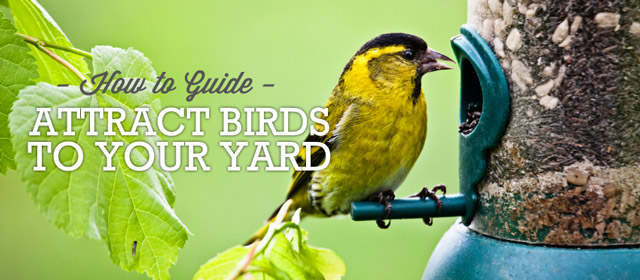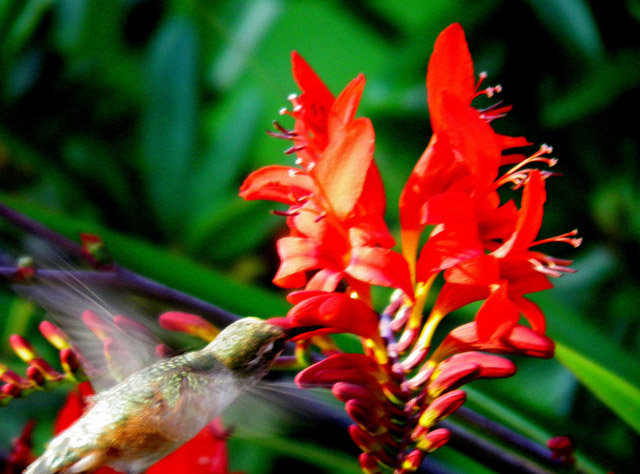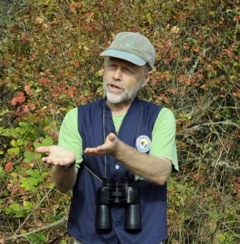Written by Guest Blogger, Ernie

Many gardeners have a love/hate relationship with birds and other wildlife. While it can be fun to watch the little critters, sharing your flowers and produce with them can be a bit of an inconvenience. However, there are a lot of benefits to attracting birds to your garden. Below are reasons why and ways that you can do so.
Why Attract Birds?
Birds visit gardens to eat. Like humans, they need a varied diet. So if you provide a variety of plants, they won’t focus on just your berries or tomatoes. By providing a variety of flowers and seeds, you can get the benefits of avian visitors without sacrificing your food supply.
The main benefit of birds is that they get rid of bugs and weeds. A healthy stream of birds in your garden will prevent a buildup of harmful bugs, and uproot many of your weeds. This allows the native plants in your landscape to flourish.
Attracting birds also provides you with the opportunity to witness beautiful creatures in your own yard on a regular basis. Keep a camera handy so that you can try your hand at some nature photography. Maybe you’ll even start scrapbooking.
If the birds are getting into your prized plants, you can always place netting over certain parts of your garden. Just be sure to get materials that birds won’t get stuck in. Finding injured birds in your garden is not worth saving a few tomatoes.

How to Attract Birds
Making your yard bird-friendly does not mean you have to let it run wild. You can landscape in such a way that attracts both birds and humans. The main things that birds need are food, shelter, and water. Plant trees that offer shade and plenty of perching space. The more places there are to hide from predators, the more visitors you’ll get. For double duty, provide trees that grow seeds and/or berries. These foods, added to flowering bushes and berry growing shrubs will make your yard the hoppin’ hotspot for your flying friends.
You can supplement your natural attractions with bird baths, fountains, and feeders as well. Hummingbird feeders are inexpensive to maintain, as you can easily make your own sugar-water solution. If you have seed and mullet feeders, be sure to provide good mixes that don’t contain pesticides and harmful chemicals. A lot of packaged mixes have a bunch of filler that birds don’t actually prefer, so watch out for that.
A water feature can add a lot to your lawn. It brings an air of natural peacefulness to an area. Weather you install a pond, fountain, or bird bath, be sure to maintain it well. Water features can also be breeding grounds for bacteria, so keep them clean. You may need to add a heating function. Line baths with plastic so you can easily lift ice out. Night lights and small lamps can go a long way to prevent freezing.
You don’t have to stop at birds though. Putting nuts out might keep squirrels away from your feeders, but give you the benefit of their presence in your yard. Watching squirrels titter away can be fun as long as their aggression doesn’t startle other wildlife.
Reptiles and amphibians keep bugs away too, so if you have a pond, consider a ceramic toad house to keep toads cool in the summer. They’re great for eating those pesky insects and are great conversation pieces with the grandkids (“how about you go kiss that toad and see if it turns into a prince?” “EWWW!”).
If you take these steps to provide sufficient food, water, and shelter for your native birds, your garden is sure to benefit. You can start by utilizing the resources you already have- bugs and plants, and expand your efforts from there. If you have any tips for attracting birds to a garden, share them in the comments below.
ABOUT ERNIE
 Ernie Allison has been a “bird nerd” since he was a kid. He loves contributing to conservation efforts and spreading awareness to issues concerning birds and nature in general. Writing for birdfeeders.com has given him the opportunity to spread awareness as well as learn about hummingbird migration patterns himself.
Ernie Allison has been a “bird nerd” since he was a kid. He loves contributing to conservation efforts and spreading awareness to issues concerning birds and nature in general. Writing for birdfeeders.com has given him the opportunity to spread awareness as well as learn about hummingbird migration patterns himself.

